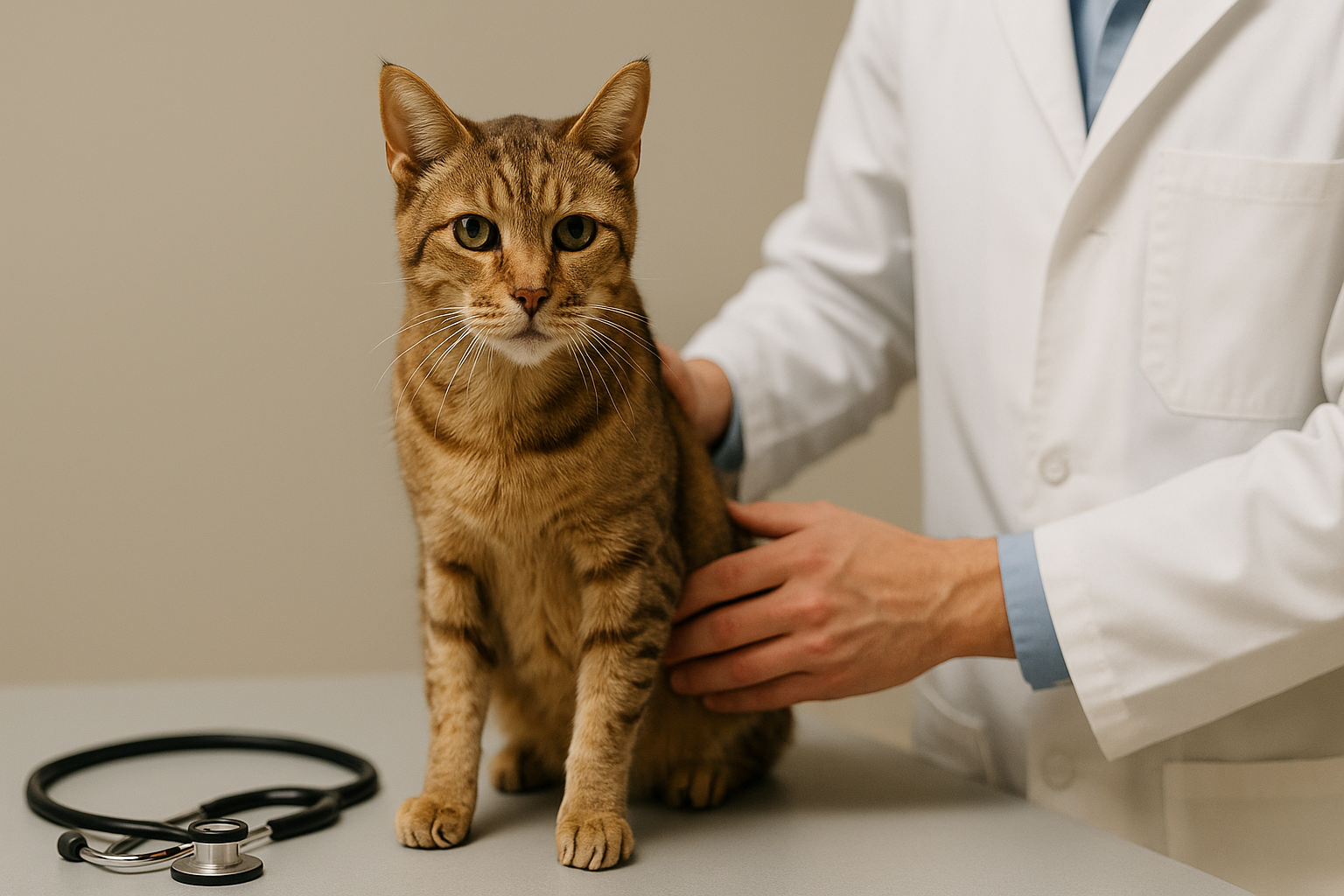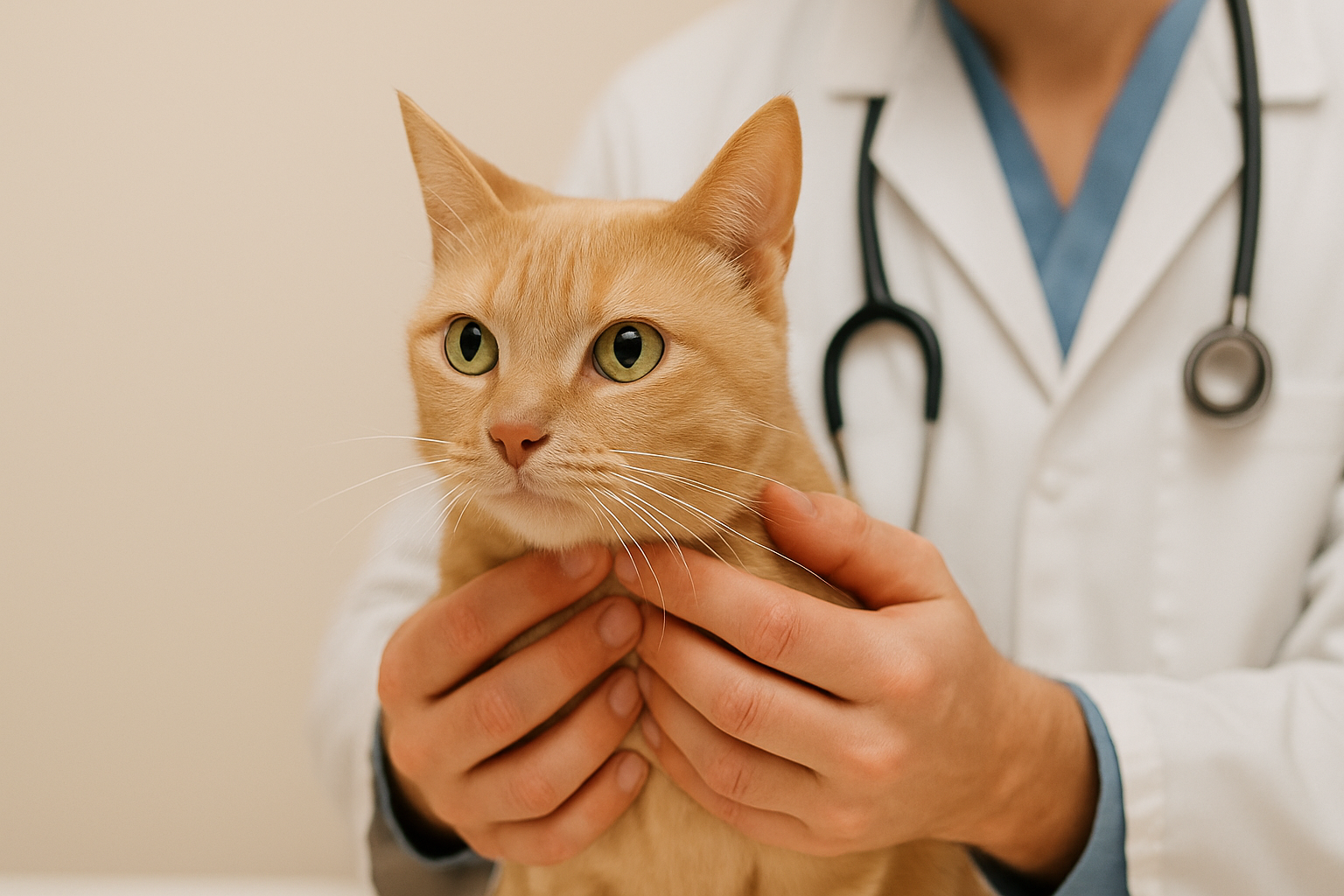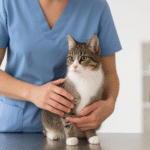Hyperthyroidism in cats is one of the most common hormone problems in older cats. It happens when their thyroid glands make too much hormone, which speeds up their metabolism. That can lead to weight loss, a racing heart, and even heart or kidney issues. But here’s the good news: with the right care, most cats do really well.
This guide covers everything you need to know—from early signs to treatment options and what to expect long term. Whether your cat’s already been diagnosed or you’re just noticing some changes, you’re in the right place.
What Is Hyperthyroidism in Cats?
Hyperthyroidism happens when one or both thyroid glands (in the neck) get too active and make too much hormone. It usually affects cats over age 10. Most of the time, it’s caused by a non-cancerous growth called an adenoma. In rare cases, it can be thyroid cancer.
Because thyroid hormones control metabolism, too much of them can make your cat’s body go into overdrive—burning energy too fast and putting strain on the heart and other organs.
Are Some Cat Breeds More Prone to Hyperthyroidism?
While any senior cat can develop hyperthyroidism, some breeds may be more likely to experience it. Research and veterinary reports suggest that Oriental-type cats might have a slightly higher risk, possibly due to their naturally high metabolism and slender body type.
Breeds that have been noted more frequently in veterinary cases include:
Hyperthyroidism is also very common in mixed-breed domestic cats as they age. Even if your cat isn’t on this list, it’s still important to watch for the signs once they reach their senior years.
Symptoms of Hyperthyroidism in Cats
Signs can sneak up slowly. Often, the first thing people notice is that their cat is eating a lot but still losing weight. Other common symptoms include:
- Weight loss, even with a big appetite
- Drinking and peeing more than usual
- Acting restless or extra energetic
- More meowing or yowling
- Messy or thinning fur
- Vomiting or diarrhea
- Fast breathing or panting
- Racing heart
- Muscle loss
Late-stage hyperthyroidism can cause severe weight loss, weakness, high blood pressure, and even heart or kidney disease. Some cats also act anxious or confused.
Diagnosing Hyperthyroidism
Your vet will usually do a physical exam and run bloodwork. A high T4 hormone level is the main clue. They may also check your cat’s liver, kidneys, and blood pressure, since those can be affected too.

If the results aren’t clear, your vet might run more tests—like a T3 suppression test or a thyroid scan. Catching it early makes a big difference.
Treatment Options for Hyperthyroidism in Cats
Treating hyperthyroidism is very doable. Your vet will help you choose the best option based on your cat’s age, health, and your budget. In most cases, treatment happens in one of four ways:
1. Medication (Methimazole or Felimazole)
This daily medicine (pill or gel) helps lower thyroid hormone levels. It works well but needs regular checkups to monitor for side effects like upset stomach, itching, or liver changes.
2. Radioactive Iodine Therapy (I-131)
This is a one-time injection that destroys overactive thyroid cells. It’s safe, effective, and usually cures the condition. Your cat will need a short hospital stay for isolation, and it can be pricey—but it’s often the best long-term fix.
3. Prescription Diet
Veterinary diets like Hill’s y/d are designed to limit iodine intake, which the thyroid needs to produce hormones. A prescription diet for cats with hyperthyroidism may help manage the condition if it’s fed exclusively. However, it’s not curative and may not be ideal for picky eaters or multi-cat households.
| Preview | Product | Price | |
|---|---|---|---|

|
Hill's Prescription Diet y/d Thyroid Care Dry Cat Food, Veterinary Diet, 8.5 lb. Bag | $83.99 | View on Amazon |
4. Surgery
Removing the thyroid gland used to be more common but is less popular now due to risks from anesthesia and possible complications. It can still be a good option for some healthy younger cats.
What Happens If Hyperthyroidism in Cats Is Left Untreated?
Without treatment, hyperthyroidism can be dangerous. It puts pressure on the heart and kidneys, raising the risk of heart failure, high blood pressure, and kidney damage. Your cat may lose a lot of weight and energy over time.
Even if they seem okay at first, untreated hyperthyroidism can really shorten a cat’s life and make them feel miserable.
Can You Use Natural or Holistic Treatments?
You’ll find lots of natural or holistic remedies for hyperthyroidism in cats online, but most of them haven’t been proven to work. That said, some supportive options can be helpful when used alongside vet-approved treatment.
Supplements like omega-3s, calming aids, or kidney-support diets may offer benefits for overall health—but they won’t cure the condition. Always check with your vet before trying anything new.
| Preview | Product | Price | |
|---|---|---|---|

|
Nordic Naturals Omega-3 Cat, Unflavored - 2 oz - 304 mg Omega-3 Per One mL - Fish Oil for Cats with... | $15.26 | View on Amazon |
Hyperthyroidism in Cats: Life Expectancy and Prognosis
With treatment, cats with hyperthyroidism often live for many more happy years. Staying on top of vet visits, blood tests, and meds (if needed) helps keep things in balance.
Some cats also have kidney disease, which needs special attention. Your vet will work with you to manage both safely.
What You Can Do Next
Hyperthyroidism is common—and treatable. The sooner it’s caught, the easier it is to manage. Whether you go with meds, diet, or radioactive iodine, there’s a plan that can work for your cat.
If your cat is losing weight, acting restless, or eating nonstop, don’t wait. Ask your vet to check their thyroid. A simple blood test could make a big difference.



